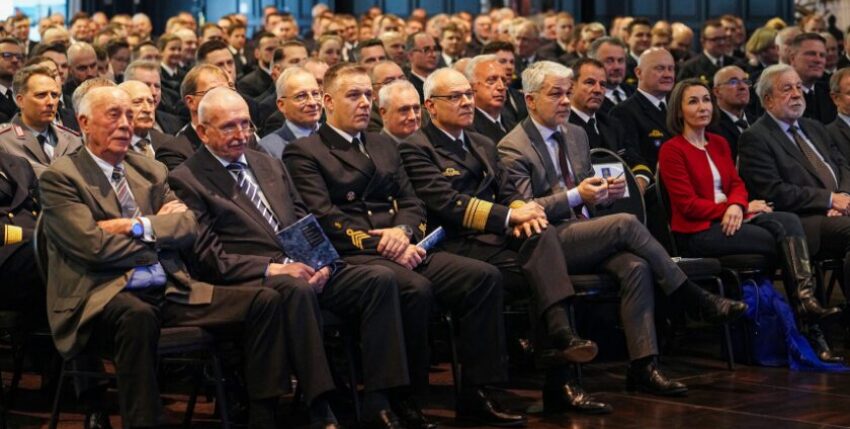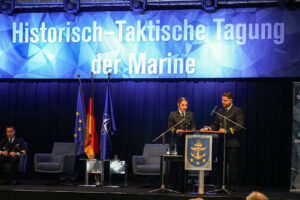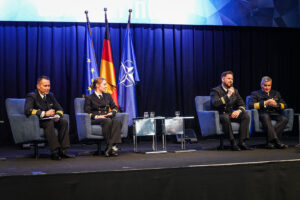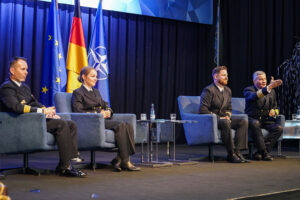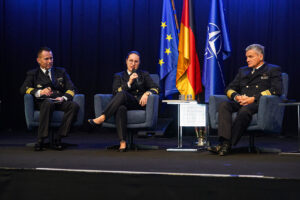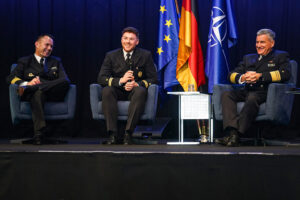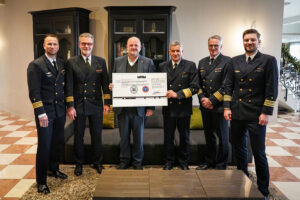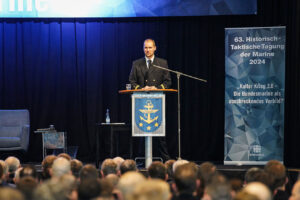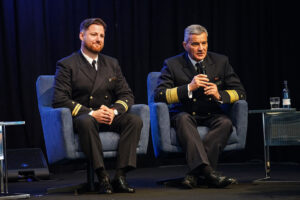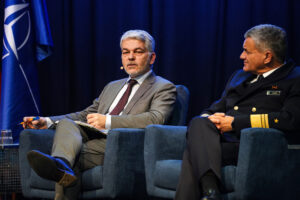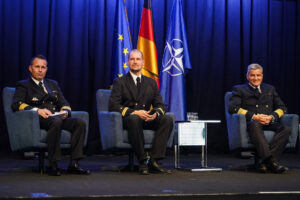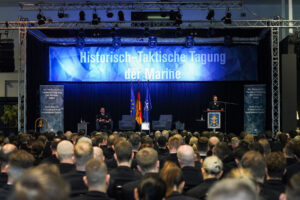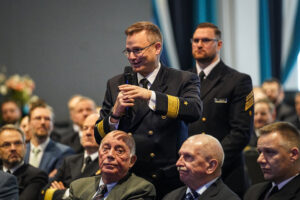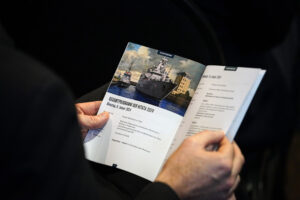Naval officers and guests met for the 63rd time at the Historical Tactical Conference. Host Vice Admiral Lenski came up with some innovations and surprises.
There was snow in Linstow, but otherwise the Naval Historical Tactical Conference (HiTaTa) began as usual: with long queues in front of the reception, which those present happily and warmly used as an opportunity to greet each other. And who came? The "who's who" of the German Navy of course, the double-gold oak leaves almost complete, illustrious guests and traditionally the representatives of the institutions that accompany and support the Navy, including - for 50 years, by the way - the marine forum.
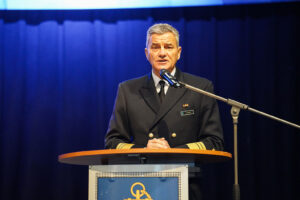
The first change took the stage in the morning before the traditional welcome by the host, the Commander of the Fleet and Support Forces, Vice Admiral Frank Lenski: Frigate Captain Göran Swistek, equipped with a headset microphone, led through the programme standing and walking. The kind of confident presentation you want to see these days. When the commander greeted the 620 participants at the 63rd Historical-Tactical Conference of the Navy with the topic "Cold War 2.0 - The German Navy as a deterrent role model?" with the words "But now to the situation of the Navy at the beginning of the year", nobody immediately noticed his prank. However, as he continued his presentation on the mission, the threat on the northern flank and the need for an international presence, it dawned on him: he was quoting from the speech given at the HiTaTa in 1983 by Vice Admiral Bethge, Inspector of the Navy from 1980 to 1985!
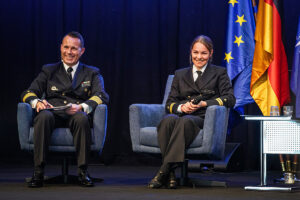
When he pointed out that the gentlemen in the front row may have been sitting in the last rows at the time, the audience also noticed how these rows were occupied: significantly more young officers than usual, a decision that proved to be refreshing in the course of the HiTaTa. The fact that many sea captains were no longer invited as is traditionally the case is said to have caused some sulking. It was also striking how relevant the words from 1983 were and how much "these words are still valid today". And the topicality justifies the discussion of that time: "Can the German Navy serve as a role model for functioning deterrence?".
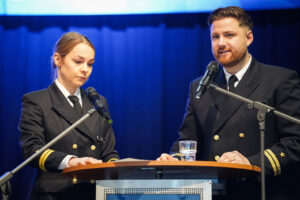
With good wishes for 2024 and a positive review of the anniversary year, he thanked all the servicemen and women for what they had achieved and referred to the ongoing missions and projects that demand everything from those involved - under politically serious conditions with ongoing wars and various crises. With the official welcome of the Inspector of the Navy, he then immediately announced a change in the programme. He then traditionally welcomed the former inspectors, commanders and "external admirals" present, as well as the representatives of the organisations.
Historical parallels
He took the opportunity of welcoming the historians who are an integral part of HiTaTa to remember and honour the recently deceased: "Back in October, we had to bid farewell so suddenly and unexpectedly to our esteemed comrade and friend Captain Dr Jörg Hillmann. We have lost not only our loyal comrade, but also the navy and indeed the entire Bundeswehr, a profound expert on German military history. And last Saturday night, Dr Stephan Huck, Managing Director of the German Naval Museum Foundation for over 20 years, lost his battle with cancer. We can only bow our heads in gratitude and humility to his incredible life's work and wish his family strength and courage."
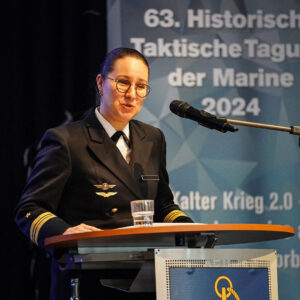
Vice Admiral Lenski went on to outline the mission during the Cold War, enumerating the number of units and personnel strength, which is impressive from today's perspective. With the description, he posed the question "Are there any parallels at all ..., was everything really better in the past? And what can the period of the German Navy teach us?" And then came what comes up at every historical-tactical conference: the HiTaTa rules. He quoted "as instructed" the notes on the "scientific congress", "censorship" and the "reason to smile". Rule eight - applause - is no longer a fixed requirement: the commander has no objection if people want to applaud him. Another change, then, but not everyone noticed it straight away: The name of the founder of HiTaTa was not mentioned. That was not unintentional.
The sequence of the first four lectures was interrupted in the afternoon by a panel discussion. Carlo Masala from the Bundeswehr University Munich and Claudia Major from the German Institute for International and Security Affairs (SWP) spoke on the topic of "The importance of nuclear deterrence then and now?". The latter had already familiarised those present with the current security policy situation at the Flag Officers' Evening. Both scientists clearly raised the "nuclear IQ" of those present, as Carlo Masala described it. It became clear how nuclear deterrence is changing from political to military, what role Germany plays or could play and how Europe needs to cooperate in this sector. It was alarming to realise that the importance of these weapons has increased and that even the reduction in their number, coupled with international proliferation, does not reduce the danger.
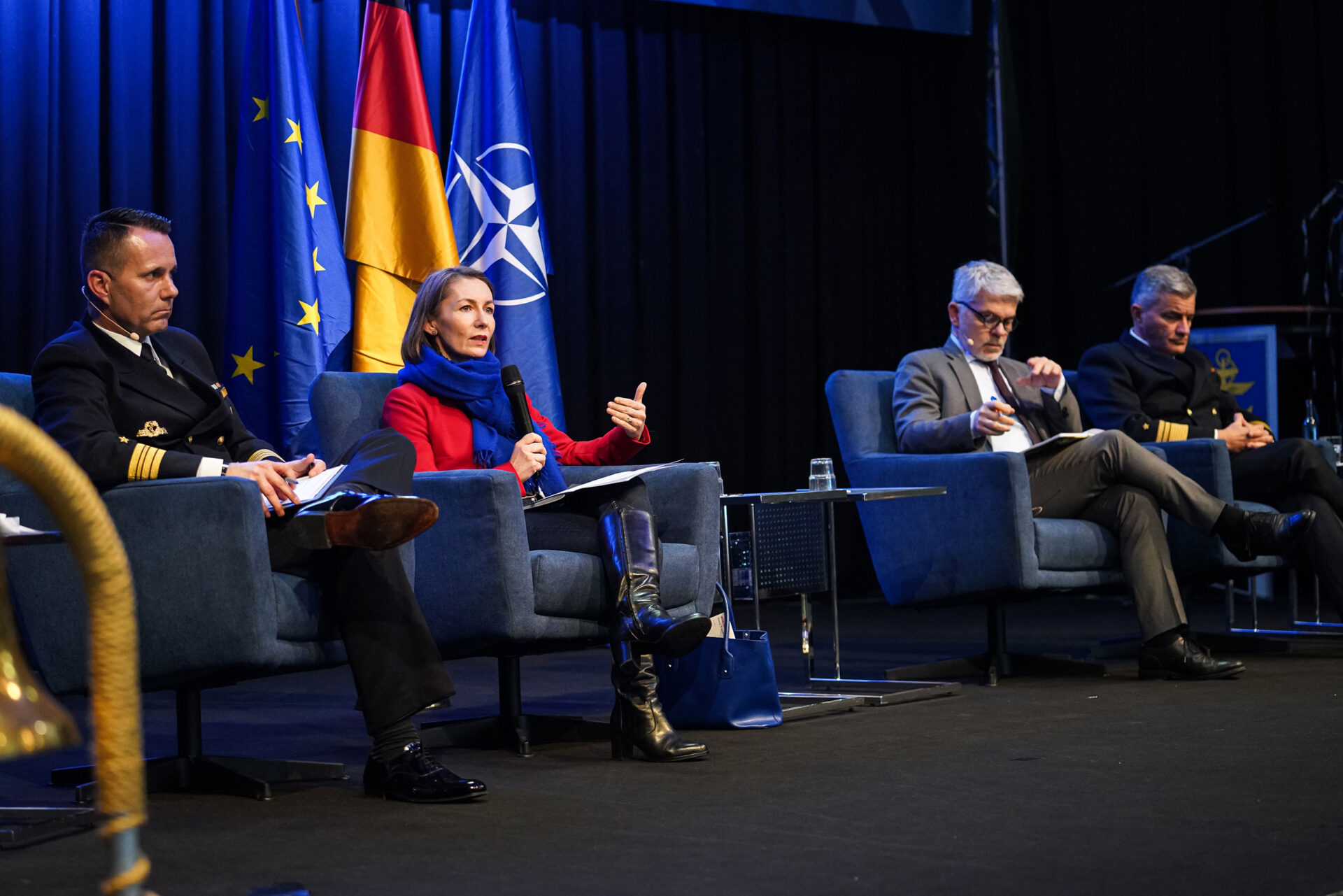
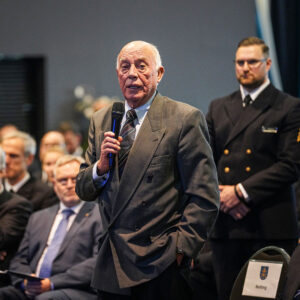
As always, the requests to speak at the presentations could be made standing up, but could also be submitted digitally to the organisation team via an app called Mentimeter. Captain Schmidt-Thomée acted like a sidekick on a talk show and summarised the questions from the audience. However, the application is not fast and the questioners remained anonymous. Something the organisers should reconsider, as the commander encouraged everyone to "actively participate in the discussions with an open mind".
As usual, the social evening was lively and went late into the night. Maritime entertainment was provided by the performances of the Kiel Naval Music Corps under the direction of Lieutenant Captain Inga Hilsberg and the poetry matros Veronica Scholz.
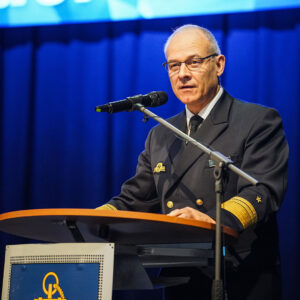
The third day began with a speech by the Inspector of the Navy, Vice Admiral Jan C. Kaack. He warmly thanked everyone for their greetings at the turn of the year before addressing the course and voyage for the coming year. He began by greeting all "comrades who spent the New Year away from home with their crews on deployment or those who are on standby today, serving from the Baltic to the Mediterranean, for the safety of the people of Germany and our allies and partners. Loyal and brave. All over the world. Every day." He made special mention of Flotilla Admiral Thorsten Marx and the commander and crew of the frigate Hessen. After a partly personal look back at the Cold War, he got to the point: there was "heavy weather ahead", the navy needed to "determine its position in the world disorder" and he wanted to "chart the course for 2024". The first of his focal points was the war in Ukraine and the security environment, which continues to change at breathtaking speed with worrying effects.
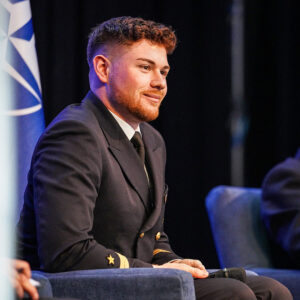
Added to this are megatrends such as artificial intelligence and its militarisation, demographics, hypersonic weapons and the use of autonomous platforms. "We have to adapt to this - whether we like it or not," said the inspector. He addressed the Taiwan issue as well as the development of the Russian armed forces and its navy. "Nobody is questioning the fact that war could become an immediate reality for us again." To determine the position of the navy in the "world disorder", he made significant reference to the Navy 2035+ course. New types of weapon systems, innovative cooperation and the start of experiments are forward-looking. There have been successes, he said, with the Northern Coasts manoeuvre under German leadership pointing the way forward and the new Arsenal landscape a real gain.
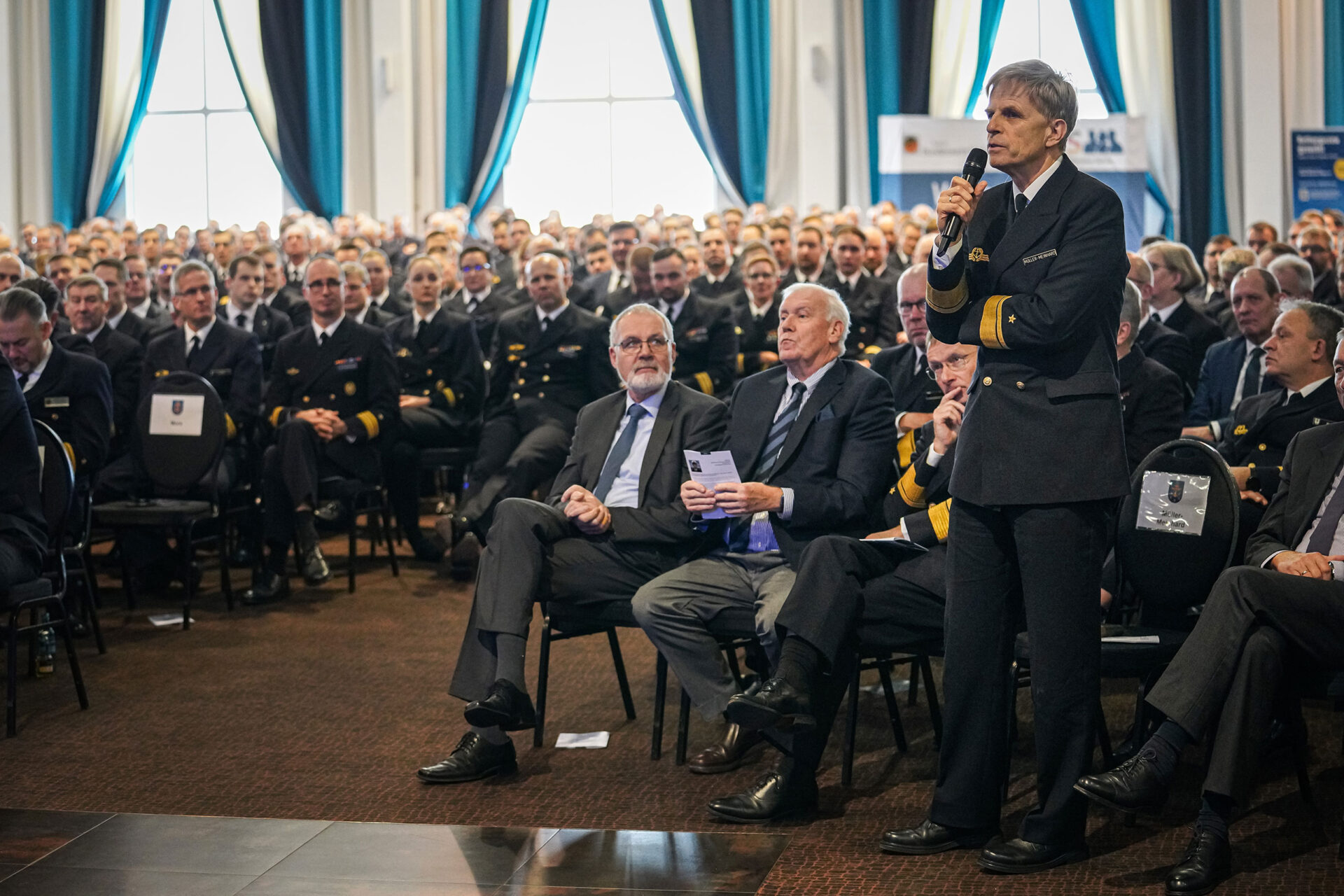
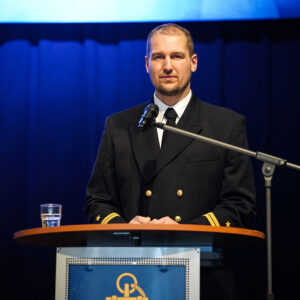
The recruitment of new recruits for the navy must be viewed negatively. Unfortunately, the personnel situation has not improved in the past year and is becoming increasingly critical. The inspector chose clear words: it is disastrous. He appealed to everyone to support the "talent magnet community". "Unfortunately, this year we have also had examples of superiors who have clearly steered their own course, even actively hindering success. Not good! Andrehen!" A whistle from the inspector in front of an audience is also rare.
Personnel, Ammunition, Pacific
Admiral Kaack's third focus was on charting the course for 2024. He wants the year to be fight now as the year of action and the prelude to "fighting through" his 2035+ course. His guideline: "So, old rule: first turn hard and then come up slowly. Otherwise you'll mess up the manoeuvre." The admiral also explained how he envisions the "naval family" and mentioned the most important international partnerships. The inspector's top three priorities are: Personnel, ammunition and the Indo-Pacific Deployment 2024, for him the The Navy's major project this year: "Not "training in non-domestic waters, but an operation". Kaak's closing words are his trademark: "Because we are a navy and you are all one of us."
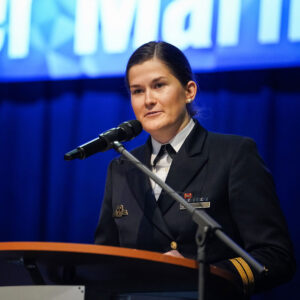
The last presentation was given by First Lieutenant Franziska Borrmann. Emotions arose. She quoted a non-commissioned officer from the Rottweil and spoke from the heart of many of those present - and we don't want to withhold this from our readers: "But we can take it. Because we always have the hope that things might get better after all. Because we love all this shit here." The commander of the fleet picked up on this quote in his closing speech and repeated it in his own way. Lenski thanked the speakers, the organisation team and the guests. He recognised clear parallels that could be seen from the presentations between "then and now". And yet a one-to-one transfer of the approaches of that time is often difficult, as the speakers clearly demonstrated. He concluded with a hearty Bravo Zulu.
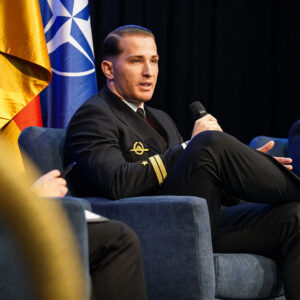
Over the course of the conference, it was clear that the passion for this unique naval format is not waning. This year, it has even received a further boost, because HiTaTa can also be "new" without cutting off old habits. They are only carefully pruned, with respect for tradition and history. And HiTaTa can also be "young" without marginalising its elders.
The chutzpah, skill and incredible self-confidence of the speakers were impressive and refreshing. Not only because of this, but also because of the topicality of the subject, it was not historians who spoke, but rather contemporary witnesses. And the HiTaTa can also be "personal": the rejuvenation is convincingly lived by the inspector and the commander, who are increasingly developing into a congenial duo. They show that you can also be approachable as a "three-star".
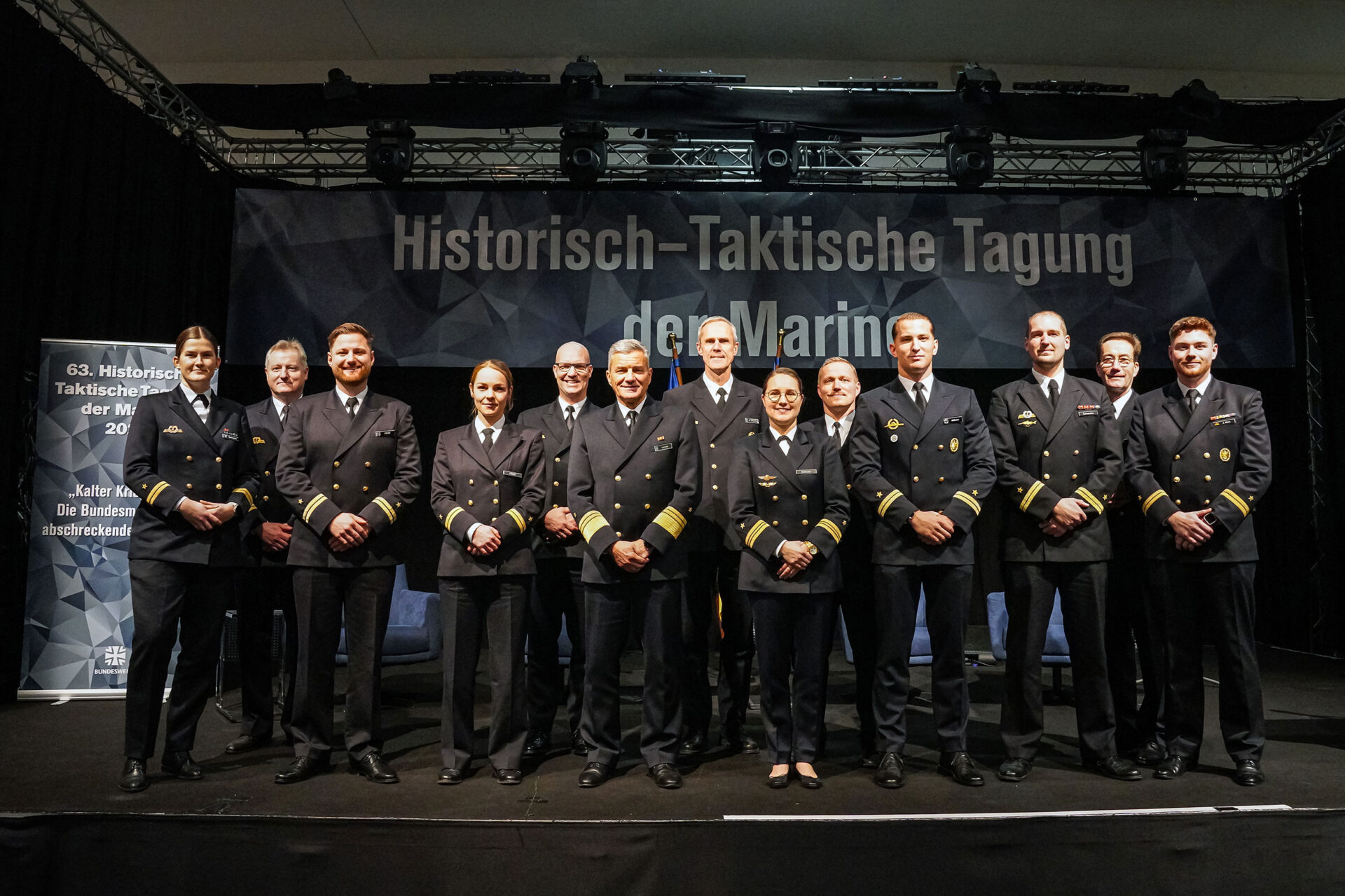
These are not times for embellishments, but for open words. This creates trust, a sense of belonging and promotes the uncopyable cohesion of the Blue Scarf. Countable proof of this were the stands of the associations, which were well attended by young officers. The representatives recorded numerous entries there.
Holger Schlüter

